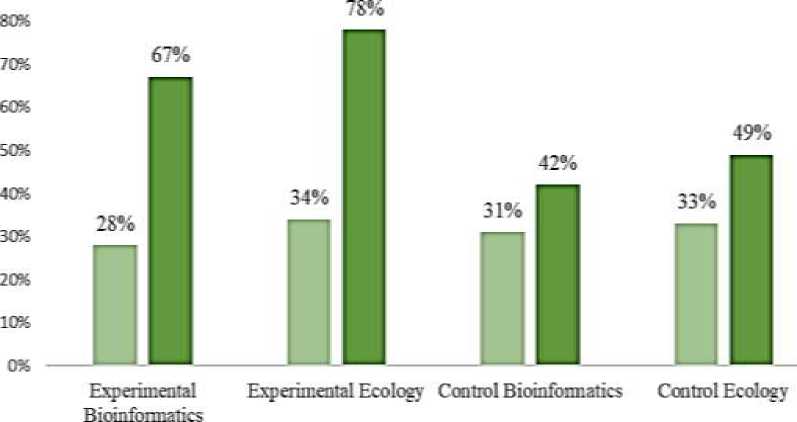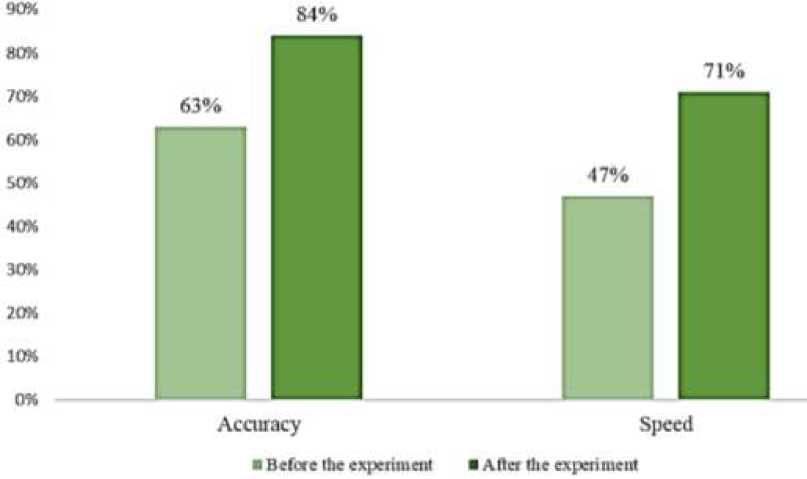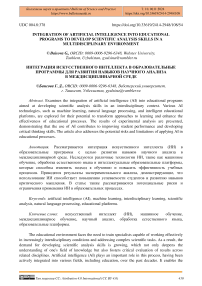Integration of artificial intelligence into educational programs to develop scientific analysis skills in a multidisciplinary environment
Автор: Baisova G.
Журнал: Бюллетень науки и практики @bulletennauki
Рубрика: Социальные и гуманитарные науки
Статья в выпуске: 11 т.10, 2024 года.
Бесплатный доступ
Examines the integration of artificial intelligence (AI) into educational programs aimed at developing scientific analysis skills in an interdisciplinary context. Various AI technologies, such as machine learning, natural language processing, and intelligent educational platforms, are explored for their potential to transform approaches to learning and enhance the effectiveness of educational processes. The results of experimental analysis are presented, demonstrating that the use of AI contributes to improving student performance and developing critical thinking skills. The article also addresses the potential risks and limitations of applying AI in educational processes.
Artificial intelligence (ai), machine learning, interdisciplinary learning, scientific analysis, natural language processing, educational platforms
Короткий адрес: https://sciup.org/14131439
IDR: 14131439 | УДК: 004.8:378 | DOI: 10.33619/2414-2948/108/54
Текст научной статьи Integration of artificial intelligence into educational programs to develop scientific analysis skills in a multidisciplinary environment
Бюллетень науки и практики / Bulletin of Science and Practice
UDC 004.8:378
The educational environment faces the need to train specialists capable of working effectively in increasingly interdisciplinary conditions and addressing complex scientific tasks. As a result, the demand for developing scientific analysis skills is growing, which not only deepens the understanding of one's field of knowledge but also fosters critical evaluation of results across related disciplines. Artificial intelligence (AI) plays an important role in this process, having been actively integrated into various fields, including education, over the past decades. It enables the automation of data processing, in-depth analysis of complex systems, and the optimization of decision-making processes.
The application of AI in education opens access to new forms of interaction with educational materials, allows for the creation of personalized learning paths, and promotes the integration of knowledge from different scientific fields. However, despite the significant potential of AI, its integration into educational programs faces several challenges. It is necessary not only to adapt existing curricula but also to develop new methodologies that take into account the specificities of working with AI in an interdisciplinary environment. The aim of this article is to explore ways of integrating AI into educational programs to develop scientific analysis skills.
Main part. Integration of AI into educational systems
With the advancement of AI technologies over the past decades, educational systems have begun actively incorporating intelligent tools that are changing approaches to learning and professional development. These technologies provide new ways of interacting with educational materials, help personalize the learning process, and increase learning efficiency through data analysis (Table).
Table
USE OF AI TECHNOLOGIES IN EDUCATION [ 1, 2 ]
|
Technology |
Description |
Examples of use in education |
|
Machine learning |
A technology that allows computers to learn and improve their actions based on data without explicit programming. |
Machine learning-based systems offer tailored assignments depending on the student's progress, increasing their engagement and academic performance. |
|
Natural language processing |
Technology that helps computers understand, interpret and generate human language |
Natural language processing programs automate the review of assignments and help students structure their work by providing feedback on important aspects of the text. |
|
Intelligent educational platforms |
Systems that use AI to automate tasks, analyze data, and provide recommendations tailored to the needs of the user |
Platforms like Coursera use AI to create personalized trajectories, and virtual assistants help with routine tasks. |
Technologies AI play a crucial role in transforming modern processes. These systems not only facilitate the processing of large volumes of data but also create opportunities to tailor solutions to specific tasks, providing personalized approaches and automation. As a result, AI has become an essential tool for increasing efficiency and accuracy across various fields, demonstrating its potential for further development and integration into the future digital society.
The use of AI plays an important role in supporting the critical assessment, interpretation and synthesis of data that are necessary for scientific analysis. In an interdisciplinary context, scientific analysis becomes an important skill, requiring the ability to work with information from various fields of knowledge, integrate the collected data, and build new hypotheses based on them [ 3 ] .
The use of AI is important in teaching students’ interdisciplinary approaches, which is especially relevant in fields such as bioinformatics, cognitive science, and ecology. In bioinformatics, AI is used to analyze large volumes of biological data, helping students understand methods for processing genomic information and developing new drugs. The use of AI in cognitive science makes it possible to analyze behavioral and neurophysiological data, which is hidden behind the study of the interaction between the brain and behavior [4]. In ecology, AI helps process satellite data to analyze ecosystem health, forecast climate changes, and model ecological processes. Such approaches require synthesizing knowledge from biology, geography, mathematics, and physics, making AI an indispensable tool for interdisciplinary scientific analysis.
Thus, the integration of AI into educational programs not only contributes to the improvement of scientific analysis but also fosters the development of interdisciplinary thinking in students across different fields of study. The use of AI becomes a powerful tool for creating flexible educational trajectories, which is especially important given the increasing complexity of scientific tasks.
Methods
As part of the study on the integration of AI into educational programs aimed at developing students' scientific analysis skills in an interdisciplinary environment, comprehensive research was conducted. This included several stages aimed at evaluating the effectiveness of AI in learning and analyzing its impact on academic performance and the development of students' analytical abilities.
To collect practical data on the perception and use of AI in educational processes, surveys were conducted among teachers and students. Teachers assessed the usefulness and ease of using AI in education and its impact on the learning process. Students provided feedback on how AI helped them develop analytical skills and understand the material. The surveys included both quantitative and qualitative questions to capture all aspects of AI influence on learning.
Experimental programs, incorporating various AI tools such as adaptive learning courses and digital assistants, were developed and implemented as part of the study. These programs were tested in real educational settings to analyze their effectiveness and impact on students' performance. Participants in the experiment used AI platforms to complete learning tasks, interacted with virtual tutors, and received personalized assignments based on their knowledge level.
The following methods were used to assess the effectiveness of AI:
Analysis of student performance. The academic results of students participating in AI-supported programs were compared to those using traditional learning methods. Both overall academic results and progress in individual disciplines were evaluated.
Evaluation of analytical skills development. Students completed assignments requiring the use of scientific analysis methods, and their results were compared with previous achievements.
These methods allowed us to assess how AI affects educational programs and identify its potential for improving learning processes and supporting interdisciplinary education.
Results
The study on AI integration into educational programs demonstrated significant positive effects on the development of students' scientific analysis and cognitive abilities. The results of the experiments showed that students using AI tools within educational programs achieved higher academic performance compared to the control group (Figure 1).
The chart demonstrates a significant improvement in student performance in the experimental group where AI tools were used. In the experimental group using AI, student performance increased substantially: in bioinformatics from 28% to 67%, and in ecology from 34% to 78%. In the control group, where AI was not applied, the increase was less pronounced: in bioinformatics from 31% to 42%, and in ecology from 33% to 49%. These data confirm that the use of adaptive learning systems based on machine learning and intelligent assistants improves the effectiveness of studying complex disciplines, such as bioinformatics and ecology, by providing personalized learning trajectories and automatically adjusting task difficulty.
Another aspect of the experiment was studying the impact of AI on enhancing the quality of scientific analysis in interdisciplinary teams. The use of AI in interdisciplinary teams positively influenced the development of scientific analysis skills (Figure 2).

■ Before the experiment ■ After the experiment
Figure 1. Percentage of students with high academic performance before and after the experiment

Figure 2. Comparative analysis of information processing accuracy and speed before and after the experiment
Students working on projects in fields such as cognitive science and bioinformatics used AI for data analysis, modeling, and result forecasting, which significantly improved both the accuracy and speed of information processing. Data processing accuracy increased from 63% to 84%, while the speed of information processing rose from 47% to 71%. These figures demonstrate that integrating AI into the learning process not only accelerated the completion of complex tasks but also enhanced the quality of scientific analysis. Students were able to integrate knowledge from various disciplines more effectively, a crucial aspect for success in interdisciplinary scientific projects.
The interaction between students from different fields of knowledge with AI tools enabled them to better understand methodologies and approaches used in related disciplines. This has contributed to the development of interdisciplinary thinking, which is necessary for modern scientific projects, where the integration of various methods and data is a major success factor.
Surveys of both teachers and students confirmed that AI technologies significantly simplified the interaction with educational materials, speeding up the learning process and increasing student motivation. Teachers noted a reduction in routine tasks, such as grading assignments and tracking student progress, allowing them to devote more time to individual consultations and academic guidance [5].
The results of the study confirm that AI not only enhances the educational process but also improves the quality of scientific analysis, especially within interdisciplinary teams. The use of AI stimulates the development of students' cognitive abilities and opens new opportunities for their scientific endeavors.
Discussion
The results of the experiments demonstrate the clear advantages of using AI in educational programs, especially in an interdisciplinary environment. The improvement in student performance and the enhancement of metrics such as accuracy and processing speed indicate that AI can significantly improve educational processes and outcomes. However, it is important to consider possible factors influencing these results, such as the students' initial level of preparation and the teachers' readiness to adopt new technologies. This points to the need for a thorough analysis and personalized adjustment of AI tools to the specific characteristics of each educational process.
The primary advantage of using AI in education is its ability to personalize learning trajectories, which contributes to more effective material retention. The implementation of AI also significantly reduces the routine workload of educators, freeing up time for individual consultations and research guidance [ 5 ] . However, there are limitations. For example, the effectiveness of AI can depend on the quality of the data on which algorithms are trained. Underdeveloped infrastructure or the lack of qualified AI specialists may slow down the implementation of such systems. It is also important to consider ethical issues related to the use of AI in education, such as student data privacy and the potential for misuse [ 6 ] .
Thus, AI has enormous potential for transforming educational processes. By analyzing large volumes of data, AI can identify students' strengths and weaknesses and provide individualized recommendations for improvement [ 7 ] . Moreover, AI can be integrated into various educational platforms and mobile applications, making it accessible to students from different regions.
A multidisciplinary approach is required to fully unlock AI potential in educational programs. Modern scientific problems often require the integration of knowledge from various fields, such as biology, computer science, economics, and mathematics [ 8 ] . AI can help students find connections between these disciplines, fostering the development of creative and analytical thinking.
Conclusion
The integration of AI into educational programs is a promising approach for developing scientific analysis skills among students working in interdisciplinary teams. The study results showed that applying AI for analyzing large datasets, modeling, and forecasting results significantly helped students improve the accuracy and speed of information processing while better integrating knowledge from various disciplines. At the same time, it is essential to consider the limitations and risks associated with using AI in education. For AI to be fully utilized in education, a multidisciplinary approach is necessary, taking into account both the benefits and limitations of AI applications in educational programs.
In general, integrating AI into educational programs can become a powerful tool for developing scientific analysis skills among students working in interdisciplinary teams. However, to achieve maximum effectiveness, it is crucial to properly integrate AI into the learning process while considering all aspects related to its use in education.
Список литературы Integration of artificial intelligence into educational programs to develop scientific analysis skills in a multidisciplinary environment
- Shuford J.Interdisciplinary Perspectives: Fusing Artificial Intelligence with Environmental Science for Sustainable Solutions // Journal of Artificial Intelligence General science (JAIGS) ISSN: 3006-4023. 2024. V. 1. №1. P. 106-123. DOI: 10.60087/jaigs.v1i1.87
- Abulibdeh A., Zaidan E., Abulibdeh R. Navigating the confluence of artificial intelligence and education for sustainable development in the era of industry 4.0: Challenges, opportunities, and ethical dimensions // Journal of Cleaner Production. 2024. P. 140527. DOI: 10.1016/j.jclepro.2023.140527
- Gyulsina B. The impact of artificial intelligence on the development of critical thinking in the process of learning stem disciplines // Холодная наука. 2024. № 8. С. 47-55.
- Almasri F. Exploring the impact of artificial intelligence in teaching and learning of science: A systematic review of empirical research //Research in Science Education. 2024. V. 54. №5. P. 977-997. DOI: 10.1007/s11165-024-10176-3
- Erkenkizi D. Analysis of SAT ability to identify gifted students: evaluation criteria and actual effectiveness // Sciences of Europe. 2024. № 148. P. 38-41. DOI: 10.5281/zenodo.13739287
- Zhou C.Integration of modern technologies in higher education on the example of artificial intelligence use // Education and Information Technologies. 2023. V. 28. №4. P. 3893-3910. DOI: 10.1007/s10639-022-11309-9
- Meng W., Sumettikoon P. The use of artificial intelligence to enhance teaching effectiveness in vocational education // Eurasian Journal of Educational Research. 2022. V. 98. №98. P. 266-283.
- Pham S. T. H., Sampson P. M. The development of artificial intelligence in education: A review in context // Journal of Computer Assisted Learning. 2022. V. 38. №5. P. 1408-1421. DOI: 10.1111/jcal.12687


